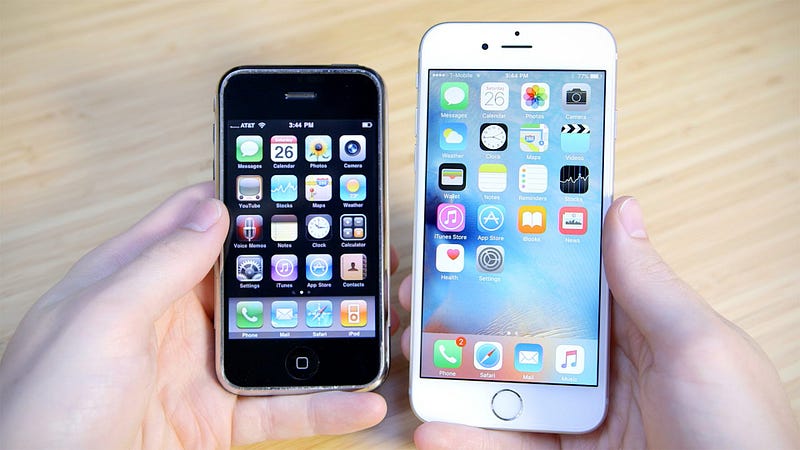There are these two young fish swimming along, and they happen to meet an older fish swimming the other way, who nods at them and says, “Morning, boys, how’s the water?” And the two young fish swim on for a bit, and then eventually one of them looks over at the other and goes,“What the hell is water?”

This opening to David Foster Wallace’s famous commencement speech is coming to my mind more and more often these days. Somewhere along the way — I’m not sure when, but recently—it became in vogue to talk down about what we’ve technologically accomplished for the past few decades.
Everywhere you look, read, and listen, it seems technology is nothing but one giant disappointment.
Social media! Cell phones! Twitter is destroying America! Selfies!

It’s not that the epicenter of technological innovation hasn’t doubted itself — it has. “We were promised flying cars, and instead what we got was 140 characters,” goes the now famous quip, from the now infamous Silicon Valley personality.
But Thiel is hardly alone. Perhaps for some reason I have a biased sample, but the chorus is getting louder. A good friend of mine wrote this the day after Apple’s WWDC keynote:
So after seeing the output of Apple’s announcements today, I’m wondering, where are the revolutionary technologies? I saw a tech titan speak 5 or 6 years ago and claim that real, world-changing innovation had stopped with the agricultural advances of the mid-to-late 20th century, maybe with the intro of the personal computer. What technology is fundamentally changing humanity for the better today? After decades we’ve got smartphones and social media — cool to be sure, but only questionably positive for human advancement (negative in some ways). And other promising technologies (clean energy, interplanetary travel, AI, robotics) still haven’t materialized fully. What’s humanity’s next big advancement on the order of Norman Borlaug’s agriculture, antibiotics, the car, or nuclear power?
Here’s another example from a listener to Exponent who recently wrote in:
It’s funny, I never hear mentioned that: the scientists in the 60s used computers inferior to the Commodore 64 to fly man to the moon and nowadays with our supercomputers most normal people apparently aren’t very bright, as no one is really doing anything outstanding with the supercomputers, or am I mistaken here?
Happily, academia has piled on, too. Robert Gordon, a prominent and respected economist, published The Rise and Fall of American Growth last year. The thesis boils down to this: the late 19th century through to roughly 1940 represents a golden era, never to be replicated.
According to Gordon, here is peak human innovation — represented in all its glory:

It’s all downhill from here, apparently.
This view boggles my mind.
I have a four inch block in my pocket. Chances are, if you’re reading this, you do too.
What it can do is in many respects indistinguishable from magic.

It can summon transportation for you within minutes. Think about that. You press a few buttons on your phone, and if you’re in pretty much any major city in the world, the physical world bends to your will. You are about to have a car at your disposal to take you wherever you want to go. A year or so ago, I was on the phone with a friend having a panic attack at work in another city. Within 30 seconds, I had a car picking him up and taking him home.
It will let you communicate with practically anyone on planet earth. I’m living in America; my family is in Australia. The first time I started traveling internationally in the 1990s, there was email or horrifically expensive phone calls. With a few presses on the front of that little brick, and I have a high definition, zero latency video chat that allows me to talk to my family on the other side of the planet.

It will play any piece of music ever published in the history of mankind. Pause to appreciate just what that represents: the entire body of a field of human creativity — Mozart to Metallica. You probably don’t even have a wire connecting your magic brick to the magic speakers over your ears that will play it for you.
And that’s before you get to movies. And TV shows. And books! Every book ever written is about 30 seconds away from being on your magic brick. You can pull up Google or Amazon and search inside of every single one of them, too.

On the subject:
It will grant you immediate access to more knowledge than the President of the United States had twenty years ago. That’s right. President Clinton ain’t got nothing on that thing in your pocket.
It will grant you the ability to reach an audience that is completely unparalleled in human history. In terms of the spread of ideas, the printing press was a pretty big deal. But think about the access to it. And how much friction and distribution and cost and time was there between the inception of that idea and it ending up in the hands of the end user. Newspapers improved things — if you were Rupert Murdoch (otherwise you were pretty much relegated to Letters to the Editor. Remember those?). Radio and TV expanded the formats to audio or visual and audio, but they were still restricted to players with huge volumes of capital. Now… well now, you can pull up Medium or Youtube or any number of platforms, record a message… and hit publish. And you can reach anyone — in fact, pretty much everyone — on the planet.
I’m in San Francisco, and I chat every week with a friend in Taipei. We broadcast to tens of thousands of people, and we have nothing more than two microphones, Skype and access to the iTunes Store. And we’re just a drop in the bucket of all the the incredible content that is being created every single week… that none of us have to pay for.

There’s basically no city on the planet to which you don’t have an incredibly detailed (and free) map off which to navigate. Do you remember what it was like unfolding a paper-based map filled with ads in a new city, and having no clue where you were? Or the terror of going on a road trip without having a map? Compare that to having your location precise down to the meter, and immediate directions to wherever it is you want to go based on present traffic conditions.
Within the next 15 minutes, you could book travel and accommodation to pretty much any city on the planet. If you were so inclined, you could be leaving in hours. Once you got there, you could probably do as good a job as a local resident in terms of finding the best places to eat or things to see.

You can communicate in pretty much every language on the planet. If, on your travels, you should meet someone who doesn’t speak your language, the precision with which you could translate is now surpassed only by native speakers. Just pull up one of the myriad of options that will offer to translate for you, hold the microphone near them as they talk — and while it won’t be perfect, it’ll be pretty damn close.
And I’ve barely got halfway down the list of apps on the first page of my magical brick.
The digitization of the physical world is one of the greatest accomplishments of our species. We now have a representation of so many things — our knowledge, our art, the state of the world — as information that can be accessed and acted upon and manipulated. It’s crazy when you stop to think about it.
Add to that those magical little bricks — which serve effectively as avatars and portals into this magical world that fit in our pockets and go with us everywhere — and we have all simultaneously become nodes and sensors, drawing from and adding to a global brain that stretches all across our planet.

This technology has become so deeply embedded into our every day lives — so easy to use and so transparent — that we don’t even notice it any more.
We got here in part through the introduction of revolutionary technology, like the original iPhone (though don’t forget the skepticism that such inventions are often met with at their birth).
But while those revolutions might get most of the attention, the reason that so much magic can happen today is because the slow, grinding, laborious, boring progress that is inherent to technology. Moore’s Law and the consistent shrinking of the processor may not be sexy, and you might hate the endless upgrade cycles that your phone has come to represent.
But man it adds up. There’s a reason why one of these is a toy beside the other:

Here’s another way of thinking about it. If someone offered me a choice between a flying car and my phone, beyond the uniqueness of it, honestly… I’d probably choose my phone.
Similarly, the academic I mentioned above, Robert Gordon, is fond of asking people in his presentations whether they’d choose their toilet or their smartphone — as proof for his thesis that our golden age of innovation is over. But if he tried delivering that presentation to developing China — a part of the world that has been the fastest to pull out of poverty in history — well, he’d find plenty of people who have a smartphone but no flushing toilet in their home.
There’s a reason for that.
After the fish story, the next paragraph of Wallace’s famous commencement speech has the following line:
The immediate point of the fish story is that the most obvious, ubiquitous, important realities are often the ones that are the hardest to see and talk about.
It’s worth keeping in mind the next time you hear someone griping about tech.





